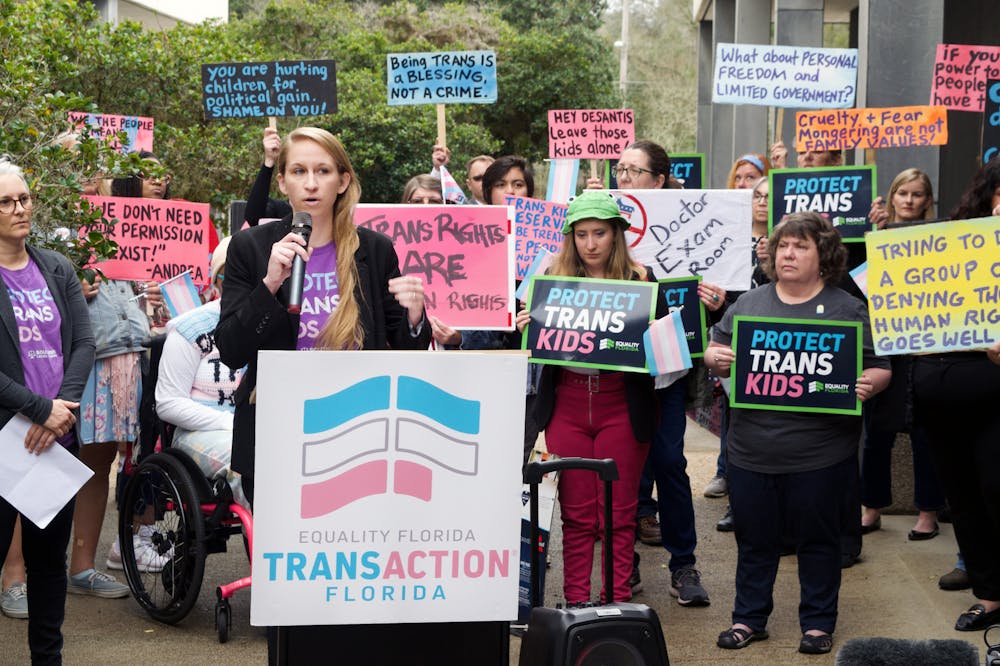Growing up, Ruka Scarlett knew she was a girl but always thought she had to hide her gender identity out of fear for what her family would think.
“Denying who I was caused a lot of mental health issues, suicide attempts [and] drug addictions,” Scarlett said.
Over the past few years, Scarlett, a 33-year-old Gainesville resident, has witnessed more people openly come out as LGBTQ. The public has also become more educated on issues like gender dysphoria — the term for when someone feels uncomfortable because of a mismatch between their gender identity and their biological sex, according to Mayo Clinic.
“Finding out about what gender dysphoria is … I realized this has been me my entire life,” Scarlett said. “I finally had to admit it, and that’s when I kind of started my transition journey.”
Though Scarlett, who identifies as transsexual, didn’t receive gender-affirming health care until she was in her 30s, she now worries for her transgender stepson and the effects of a Florida ban on care for trans youth in similar situations, she said.
Her stepson, a 14-year-old Dunnellon Middle School student whose parents requested he remain anonymous, doesn’t express concerns of severe gender dysphoria, but he is upset about the negativity directed at him and other trans children, Scarlett said.
“If we lose access to our care, I am worried that we will see a skyrocket in suicide rates because of us no longer being able to get the care we need to be who we really are,” her stepson said.
The Florida Boards of Medicine and Osteopathic Medicine voted Feb. 10 to finalize the ban on prohibiting doctors in Florida from providing gender-affirming care to trans minors. Gender-affirming care, which helps treat people who suffer from gender dysphoria, can include sexual reassignment surgeries, the use of puberty blockers or hormone replacement therapy.
Minors in Florida who are already prescribed puberty blockers prior to the ban taking effect can continue to take them, according to Southern Legal Counsel.
As of Feb. 19, it’s unclear when the ban will go into effect.
The Board of Osteopathic Medicine also voted to remove an exemption for research on gender-affirming care, which at the time the Board of Medicine had already removed.
This means trans minors will be unable to receive nonsurgical gender-affirming care in clinical trials. Research institutions, such as UF, will also not be able to conduct clinical trials on gender-affirming care.
The boards establish standards of care for medical practices in the state and have the power to revoke medical licenses. Gov. Ron DeSantis appoints members of the boards, who serve four-year terms.
Although the ban hasn’t yet gone into effect, some clinics that provide gender-affirming care for trans youth across the state are feeling the chill from the legislation, no longer taking new clients and shutting down services.
Nicklaus Children’s Hospital in Miami stopped taking patients for its gender program that offers pediatric gender-affirming care in August, the Tampa Bay Times reported. In St. Petersburg, Johns Hopkins All Children’s Hospital stopped taking new youth patients for hormone therapy at the end of 2022.
In Gainesville, the UF Division of Endocrinology is still seeing patients for its Youth Gender Program that offers services such as consultation, psychotherapy and assessment of medical readiness for cross-sex hormone therapy for youth patients.
Although the UF clinic is still providing care, it takes about three or four months to be seen for a new patient appointment, said Brittany Bruggeman, an assistant professor of UF pediatric endocrinology who works in the Youth Gender Program.
Bruggeman has worked in the program for a few years and is concerned about how the ban will impact the clinic’s patients and potentially other fields, she said.
“I’ve had multiple patients reach out to me who are worried about their existing care,” Bruggeman said.
However, new patients who have scheduled appointments that are months away won’t be prescribed any new medication if it’s needed, she said.
Michael Haller, a professor and chief of UF pediatric endocrinology, believes the ban will create challenges for new patients, he said.
“The harder issue will be for younger kids who are coming of age and becoming pubertal who have significant gender dysphoria and who would be new to treatment,” Haller said.
Residents can travel to states that offer gender-affirming care to new patients and then come back to Florida and be able to receive care, he said.
“It’s fairly restrictive, but even with current restrictions there are ways to ensure people have access,” Haller said. “We don’t want people to think that there is no way forward.”
Simone Chriss, a civil rights attorney and director of the Transgender Rights Initiative at Southern Legal Counsel located in Gainesville, serves as the medical legal partner with the Youth Gender Program. At the hospital, she meets with patients to screen for health-harming legal needs. At the legal firm, she represents trans residents of all ages.
Over the years, Chriss has advocated for LGBTQ rights and is shocked she now has to fight for children to have access to basic medical care, she said.
“I didn’t think that in the year 2023 I would be getting death threats constantly for protecting trans kids,” Chriss said.
Chriss wants to assure worried patients that the ban isn’t in effect yet and patients who have already started receiving blockers can continue to receive that care, she said.
“I’m getting calls 20 or 30 times a day from parents who are desperate to know what’s going on and afraid,” Chriss said.
Once the ban goes into effect, the law firm plans to sue the boards, she said.
Health care for trans residents above the age of 18 is still an option in the state.
Monica Rodriguez-Fernandez, a 27-year-old UF medical student who identifies as a lesbian, works at UF’s Equal Access Clinic as the LGBTQ clinic coordinator. The free LGBTQ health clinic is student-run and offers services such as gender-affirming medical therapy and screening for other health care needs every first and third Tuesday of the month.
Only patients over 18 can be seen, as the doctors and volunteers cannot provide pediatric care.
Still, she was frustrated to hear about the news of the ban as a medical provider and a member of the LGBTQ community, she said.
“It's frustrating as someone who's going to be a medical provider who works with medical providers, because I actually know a lot about gender-affirming care, a lot about the effects and the benefits and how it can really benefit somebody's mental health,” Rodriguez-Fernandez said.
The clinic hasn’t faced any issues similar to health care practitioners who work with trans youth patients but is still concerned about the future of health care for all trans patients, she said.
“All of us experience the concern that comes with the targeting toward LGBTQ health care,” Rodriguez-Fernandez said. “Patients tell me that they're worried about what their health care is going to look like.”
Some local high school students are concerned about the impact from the ban, while most are unaware or unaffected by it.
Bailey Diem, an 18-year-old Gainesville High School senior who identifies as nonbinary, said they were upset after hearing about the news of the ban.
Unlike Diem, who is the vice president of the Gender Sexuality Alliance at GHS, many of Diem’s fellow students don’t know or talk about the ban, they said.
“When I first heard about it, I was horrified,” Diem said. “I have trans friends who have either gotten gender-affirming care or wish to in the future, and the idea of them or anyone else being denied it is very upsetting.”
Contact Claire at cgrunewald@alligator.org. Follow her on Twitter @grunewaldclaire.

Claire Grunewald is a fourth-year journalism major and the Spring 2024 Editor In Chief of The Alligator. In her free time, she likes to go to concerts and attempt to meet her Goodreads reading goal.






